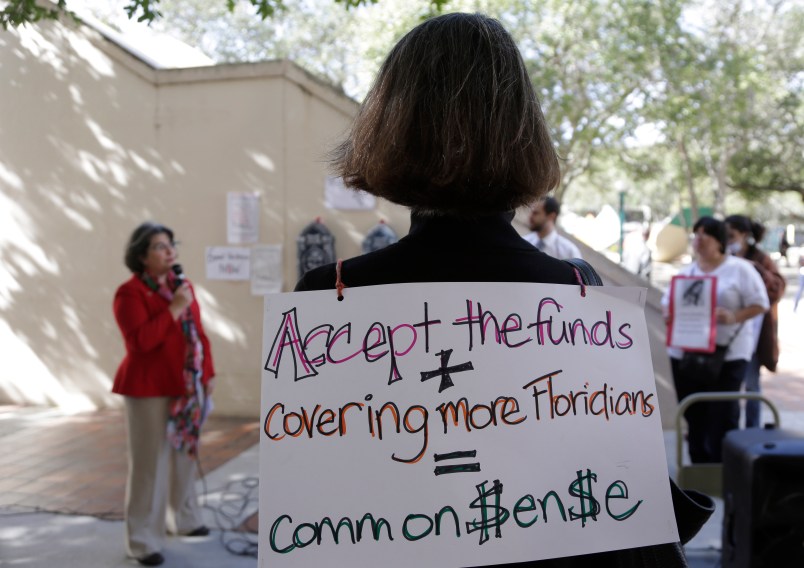A new study suggests that low-income people living in states with Obamacare’s Medicaid expansion are healthier than those in states without it, the New York Times reported. The study’s authors — who published their results in JAMA Internal Medicine Monday — were hesitant to say that Medicaid expansion prompted the results, the Times said, but the low-income people surveyed in expansion states Kentucky and Arkansas reported feeling healthier than those in Texas, a non-expansion state. The study comes as another report released Monday by the Urban Institute estimated that for every $1 state spends on its Medicaid expansion program, it brings in $7 to $8 in federal spending.
Currently, 19 states have refused to expand Medicaid.
The health survey found that respondents in Kentucky and Arkansas were, by nearly 5 percentage points, more likely to report being in excellent health than those in Texas. They were also less likely to skip taking medication due to costs, less likely to visit the emergency room and more likely to have access to primary care.
There were no difference in sex, income, or marital status among the low-income people surveyed in Texas, Kentucky and Arkansas. The Texas respondents were younger, more urban, and disproportionately Latino. Kentucky and Arkansas have different models of expanding Medicaid — the former going with a more conventional approach, while the latter uses Medicaid funds to offer private insurance to low-income individuals — but for the most part the two states exhibited similar results when the health outcomes of the respondents was surveyed.
The researchers surveyed the states’ residents three times: first in 2013, before Medicaid expansion was enacted; then in 2014, a year after its implementation, and again at the end of 2015.
The Urban Institute, with the funding of the Robert Wood Johnson Foundation, released a report Monday projecting federal and state spending if the 19 non-expansion states opted into Medicaid expansion.
While the 19 non-expansion states would spend a total of $75.9 billion if they expanded Medicaid with moderate enrollment because of the increase in caseloads, that money would be matched by $568.5 billion in federal funds. The states, meanwhile, would save $21.8 billion in uncompensated costs, while the U.S. government would save $129.1 billion in reductions in federal subsidies on exchanges, along with its own $34.9 billion saved in uncompensated care.
The projected savings for states in uncompensated care grow to $27.1 billion for the non-expansion states, if their Medicaid expansion featured high enrollment rates instead of moderate enrollment.







People in non-Medicaid expansion states like to give their poor people freedom - the freedom to get sick and die.
There is no justification for not expanding Medicaid. It should be done not only on humanitarian grounds, but also financial grounds.
Never coulda seen this coming…
It’s like if you connect the dots, there’s some kind of correlation between the two.
Weird…
The same could be said for eliminating the death penalty and promoting comprehensive sex education and making birth control widely available to anyone.
Actually, dozens of other things would likely make financial sense, but the modern Republican Party isn’t too crazy about fiscal responsibility.
It’s socalistics medcin! I don’t want no gubmit interferein’ in my healthcare! (((couch hack))) Them damn scientist always inventin’ new diseases fer us ta catch, and spraying us with them there chemtrails! Ma teeth hurtin’ something fierce and it’s all ‘cause those big towers beaming their signals inta ma head! Same goes for the lump on ma leg. I heared it was Obama’s and Hillary’s fault–they is storin’ all those lost emails in ma head! It’s gobmit interfering with my water and makin’ me drink them toxic chemicals to brain wash us all! Now go away, I go things to do! I gots to go buy mself a case of Jack and five cartons of smokes!